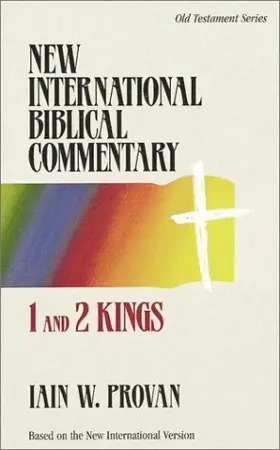

1 & 2 Kings
in Understanding the Bible Old Testament
Pages
320
Publisher
Hendrickson
Published
1/1/1995
ISBN-13
9781565630536
Collections
This book appears in the following featured collections.
- Favorite Commentaries for Personal Study by Jeremy Pierce (parableman)
- Recommended OT Commentaries by Denver Seminary Journal
- Tremper Longman's 5-Star Commentaries by Tremper Longman III
- Building an OT Commentary Library by Invitation to Biblical Interpretation (Kostenberger & Patterson)
- Top Old Testament Commentaries by Engaging Scripture (Nijay Gupta's Substack)
- TGC: Introductory Commentaries by The Gospel Coalition
Reviews
This is my most frequently recommended commentary for preachers and teachers. Provan provides enough technical data on ancient history and scholarship to inform (but not overwhelm); but he focuses on the theology and message of the book for us today. Clear, concise, and helpful.
[Full Review]
In the limited space this series offers, Provan has judiciously selected and commented on the most pertinent textual and theological issues arising in Kings. Though his comments on the construction of the temple are thin and he does not interact much with other commentators (ancient or modern), overall he is an insightful tour guide for anyone wishing to better understand these biblical narratives.
Provan receives the only 5-star recommendation from Tremper Longman who says, “The writing is accessible, and the emphasis is on literary and theological issues, though the notes also address particular exegetical issues.” Longman’s only complaint is that in keeping with the strictures of the NIBC series, the volume is too brief.
[Full Review]
Enjoyed this commentary very much. Provan has some great thought provoking questions which prevent the commentary from becoming dull and dry.
This commentary is short but is helpful and insightful in spots. For an inexpensive commentary it is recommended. He does offer some different interpretations at times then either Leithart or Fretheim. Provan sometimes tended to be more cynical of the motives and character of the kings (in this respect closer to Brueggemann). Though I thought Leithart and Fretheim often followed the intent of the author much better, this is a good commentary to supplement those.
Provan's commentary on Kings in the NIBC series may be the best individual contribution to that series. The format of the series limits the amount of space the author has, but Provan uses it wisely. He explores the theological themes of the book within its larger redemptive-historical context. Very readable and useful for pastors and teachers.
[Full Review]
Literarily and theologically sensitive, with helpful endnotes and four excurses on canonical connections. Evangelical.
[Full Review]
The editors of this series describe its approach as one of "believing criticism," which "marries probing, reflective interpretation of the text to loyal biblical devotion and warm Christian affection." For his part, Provan contends that 1-2 Kings must be read in the context of the Old Testament and the entire Christian Bible as part of a coherent narrative that defines the church. His commentary examines Kings from three angles. It is first and foremost narrative literature, so that Provan treats it in its "final form" as a unified whole. He speaks frequently of the "authors" of Kings, without describing them further except to say that they are quite skillful. But Kings is not just story; it also has a historical intent. Provan argues that the separation of text and history or of the biblical Israel and the historical Israel is unwarranted. Finally, Kings is also didactic literature. He highlights such theological themes as the uniqueness and supremacy of Israel's God, his demand for exclusive worship, his judgment for wrongdoing, his promises to the faithful, and the triumph of grace over law. It must be said at the outset that this is one of the best commentaries available within an expressly confessional series. Provan makes a number of useful and original observations about literary themes and devices within the Kings narrative. His treatment of the account of Solomon's reign (1 Kings 1-11) is especially insightful as he notes several indications of ambivalence toward Solomon in the midst of what appears on the surface to be an entirely positive description. He then finds allusions to Solomon's reign throughout the remainder of 1-2 Kings.
[Full Review]








